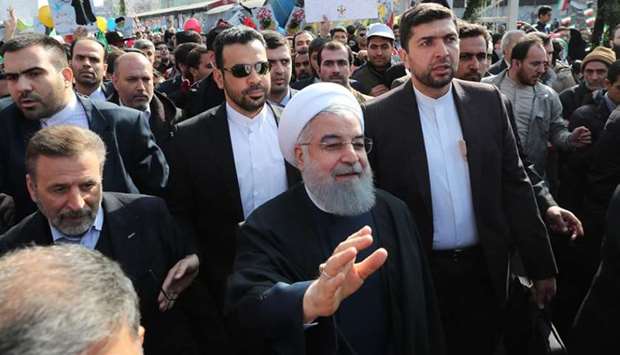Iran's President Hassan Rouhani on Sunday called for a "year of unity" after recent protests as Iran celebrated 39 years since the Islamic revolution.
Rouhani said conservative officials should not block candidates they dislike from future elections, and that there should be greater trust in the people, including the use of referenda on key issues."I request that the 40th year of the revolution, the coming year, be the year of unity. I ask conservatives, reformists, moderates and all parties and all people to come and be together," he said in a speech before a huge crowd in Tehran.
Rouhani, a long-time regime insider who won power in 2013 and again in 2017 with the backing of reformists, has faced tough criticism from conservatives over his efforts to rebuild relations with the West and ease civil liberties.
He has tried to use protests that hit dozens of cities over the new year as a way to convince conservatives that they must follow his calls for reform.
"We should trust the people. We must allow all inclinations to participate in elections," he said in an apparent swipe at the conservative-dominated Guardian Council, which regularly blocks hundreds of reformist candidates from standing in presidential and parliamentary votes.
"Our revolution was victorious when we were all together," he said.
"And today we must once again invite everyone to get on board the successful and victorious train of the revolution.
"All Iranian races, all Iranian religions, Shiites and Sunnis, Muslims, Christians, Jews and Zaroastrians -- whoever believes in the constitution, that is our criteria. He is a revolutionary and he must be respected," Rouhani said.
He raised a controversial demand to use referenda, which are allowed under article 59 of the constitution that was passed after the 1979 revolution, but have not been used for decades.
"If there are differences of opinions on a couple of issues... bring the ballot box and according to the article 59 of the constitution, whatever people say, act accordingly," said Rouhani.
His words immediately triggered support on social media, including tweets with the hashtag #referendum.
Rouhani did not specify which issues could be put in question, but his comments come amid growing debate over social freedoms including an imposed headscarf for women, which has triggered unprecedented protests by a small number of people in recent weeks.
Rouhani's office issued a study last month saying half of Tehranis did not support mandatory hijab, making it very difficult to enforce.
"We should leave people alone and not interfere in their private sphere," said Rouhani.
He referred to an order from revolutionary founder Ruhollah Khomeini, which banned the authorities from intruding in people's private lives.

